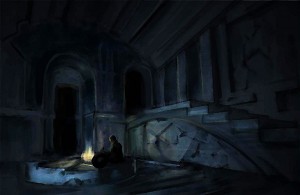Originally published February 25, 2017
This post is shown in its entirely as published by David Gerrold on Facebook along with my comments. If you are not familiar with the name, perhaps you will recall the Trouble with Tribbles, a Star Trek episode. Or, The Martian Child. David knows how to spin a tale and has made a career of building worlds, and dissecting this one. First, my comments.
“Absolutely and unequivocally on point. While in college I talked a professor into letting me write a term paper on science fiction. Not literature in her opinion—but I wrote well enough to make my point and she conceded. In fiction, sometimes most effectively in science fiction or fantasy, we have the freedom to take a social or civil issue and put it far enough away from the reader we can challenge the person without being confrontational. It is a way to engender thought by leading. David Gerrold points this out beautifully below. Hopefully he won’t mind if I publish this, with credit, on my blog.”
I think Sarah Pinsker is a marvelous writer. I admire her ability to paint a picture in words. Most of all, I admire her ambition.
In the current issue of Asimov’s, she has a story called, “The Ones Who Know Where They Are Going.” It’s a beautiful piece of work and I would not be surprised to see it ending up on various award ballots.
It’s intended to be read as a sequel to Ursula K. LeGuin’s “The Ones Who Walk Away From Omelas.”
If you have not read the LeGuin story, go do that now. I’ll wait.
If I had to pick one story to represent the entire SF genre, possibly the most memorable of all tales anyone has ever written, it would be “The Ones Who Walk Away From Omelas.”
Omelas is a beautiful city, filled with joyous people living joyous lives. But … its serenity and splendor depend on the eternal misery of an unfortunate child, kept in perpetual filth, darkness, and misery.
When citizens are old enough to know the truth of Omelas’ success, they are shown the true price of the city’s glory—that this single child must be locked away in a cruel dungeon. Most of the city’s citizens accept this as necessary to the continuing elegance of Omelas. But every so often, a few citizens cannot. They walk quietly away from the city. The last line of the story: “The place they go towards is a place even less imaginable to most of us than the city of happiness. I cannot describe it at all. It is possible it does not exist. But they seem to know where they are going, the ones who walk away from Omelas.”
What occurred to me immediately, the first time I read this story was that the wealth and success of the United States depends on foreign labor—child labor, peasant labor, and in some places even slave labor. The braceros who pick our vegetables, the Chinese factory workers who assemble our iPhones, the children in Bangladesh who sew our clothes. We don’t think about them. We simply accept that the low prices of goods at Walmart are a sign of our national success, our splendor, our wealth—but in truth, our denial of the facts about the world we live in is a sign of our cultural sickness.
The trap—the real trap—is that we cannot walk away from our own Omelas. We don’t know how. We can’t survive without the technology we’ve constructed and all the hard work it takes from so many people to keep that technology functioning and to keep us fed and clothed and amused with electronic toys.
Never mind that for the moment—the point of the story, as I see it, is that we as humans always have a choice: whether to accept injustice and live with it or reject it and refuse to participate in it further. And this is why I think it is one of the greatest stories ever written—because it isn’t about Omelas, it’s about the reader.
And that brings me to Sarah Pinsker’s marvelous tale.
I hated it.
Not because it’s a bad story, not because it’s badly written, not because it’s wrong—but because it is a philosophical and emotional reversal of LeGuin’s story. Where LeGuin leaves us troubled, Pinsker wants to let us be okay.
SPOILER ALERT.
If you haven’t read Pinsker’s story, go do so now.
.
.
.
.
.
.
In Pinsker’s story, someone has left the door to the dungeon ajar. The child, bruised and hurting, laboriously climbs the steps toward the dazzling daylight, wondering about the beauty that lies above, and speculating on how long it will take the city to collapse after the escape.But by the time the child reaches the tenth stair, he or she (never specified) stops and turns around and heads back down to the dungeon. And we are told that this is not the first time that the child has made this journey toward dazzling freedom and then returned to the sanctity of the darkness.
Now, if the point to be made here is that the child cannot deal with freedom, is afraid of freedom, that’s horrifying enough—but that’s not Pinsker’s point. No.
Instead, this child is acting out of altruism, nobility—returning to the dungeon so that no other child will have to suffer the same fate. And again, this is not the first time this child has made this great moral choice.
And as a reader, I can feel good, I can feel proud of this child for willingly martyring herself/himself for the good of—
No. I can’t.
There’s an old joke. “How many Jewish mothers does it take to change a light bulb.” “None. Don’t worry about me. I can sit here alone in the dark.” That’s also the short version of this story.
And this is why I take issue with this story. Both philosophically and emotionally.
Philosophically: Where LeGuin was saying underneath the glory of this civilization, its foundation rests on a crime, an act of profound cruelty and injustice to another human being—where LeGuin was making a profound plea, Pinsker is now excusing the cruelty and injustice. It’s all right, because the child is there willingly, the child is making a noble sacrifice.
And emotionally—it’s all right, you don’t have to feel bad. The child is doing a good thing. He/she wants to be there.
Um, no.
There’s this thing called “the victim racket.” It’s where you give away your power to others so you can feel good about never getting what you want. It’s about being right about being miserable. It plays out a lot of different ways, “I have to sacrifice for my children,” or “I’m not good enough,” or “It’s okay, I didn’t want dessert anyway.” (Or even, “I deserved the award, but the vote was rigged.”) The victim racket is about excusing injustice.
Now that might not be what Sarah Pinsker intended. Unfortunately, that’s how I read it. And as much as I try to find another interpretation, I’m stumped.
I’m not against sacrifice—every good parent makes sacrifices so his/her children can grow up to have a life they love living. But that’s an informed consent. The child of Omelas isn’t there because he or she has consented, isn’t there because of a higher purpose, isn’t enduring a noble imprisonment—the child of Omelas is there because the people of Omelas prize their splendor too much to give up the injustice.
Still with me?
Do I think Pinsker was wrong for writing this story? Hell, no. I’m glad she wrote it—because it will start the kind of discussion that all good stories must start. It invites the readers to argue about the nature of Omelas as well as the plight of the child. It invites us to consider the very real implications for our own society.
I’ll add this—the LeGuin story is necessarily incomplete. It invites the reader to decide for himself/herself about the morality of this situation.
In the hands of another writer—not me, not today—a sequel to “The Ones Who Walk Away From Omelas” would be about those who walk away.
Those who stay are accepting responsibility for the injustice, they’re owning it the same way the Germans who profited in the days of the Third Reich owned their atrocities. They decided not to care.
But those who are walking away, they’re rejecting responsibility. They’re leaving without trying to change anything. They’re fleeing the responsibility of rescuing the child. They’re unwilling to trigger the revolution that would surely occur if the city’s success were threatened. They’re unwilling to take a stand, unwilling to say, “I cannot be a part of a civilization founded on injustice. We must find another way. We must bring that child up into the light.” By walking away, they are running away.
And to my mind, the ones who walk away are just as detestable, maybe even more so than the ones who stay.
Whatever the case, I believe it is wrong to ascribe nobility to the child. It’s wrong to assume nobility among the oppressed. That’s a convenient fiction—that torture and oppression, discrimination and victimization somehow confer wisdom on the sufferers. Hell no. Torture and oppression mostly inspire outrage and hatred and counter-violence. Gandhi and Mandela and King and Frankel and Weisel are exceptions. Everybody else likely has a lifetime battle with PTSD.
That assumption of nobility through oppression—that’s why we have “the magic Negro” and the wise old native American and the sassy black lady and the insightful old Jew and the noble Asian and the spontaneously clever drag queen in American movies—because we’re afraid to acknowledge the real hurt and bitterness that our own Omelas has created, not in a single child, but in whole populations.
Perhaps there is a worthwhile sequel to be written to “The Ones Who Walk Away From Omelas.” I applaud Sarah Pinsker’s ambition in this effort. And I wish I could celebrate this story as a worthwhile sequel. Any writer this ambitious deserves applause.
But … I wonder if LeGuin’s original tale has left us with an unsolvable challenge. We are damned if we stay, we are damned if we leave. I can’t walk away—but I have no idea how to get that child out of that dungeon either.
That’s the story I want to see someone tackle.



No Comments